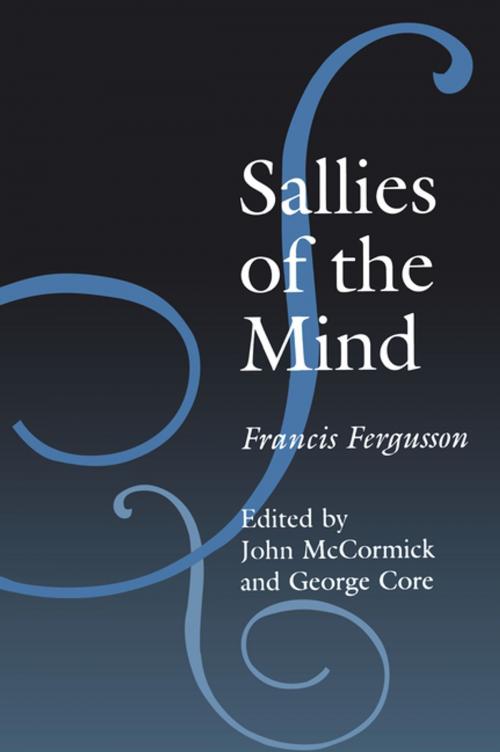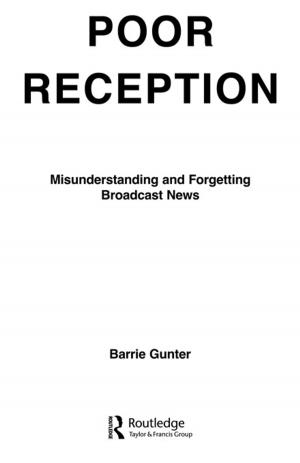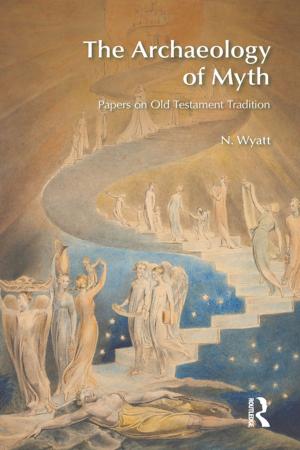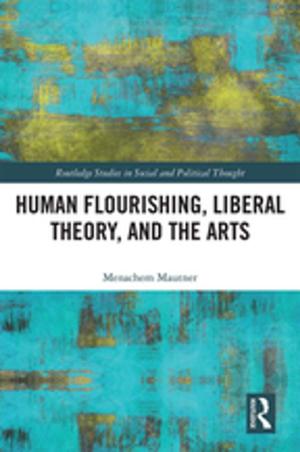| Author: | Francis Fergusson | ISBN: | 9781351291385 |
| Publisher: | Taylor and Francis | Publication: | April 17, 2018 |
| Imprint: | Routledge | Language: | English |
| Author: | Francis Fergusson |
| ISBN: | 9781351291385 |
| Publisher: | Taylor and Francis |
| Publication: | April 17, 2018 |
| Imprint: | Routledge |
| Language: | English |
Francis Fergusson was one of the foremost American literary critics and scholars of the twentieth century. A man of the theater as well as a man of letters, Fergusson's versatility and mastery traversed a wide range of intellectual disciplines. As George Core notes: "one of the most remarkable aspects of Fergusson's criticism is that it stands comfortably, at ease, with the best work stemming from diverse schools of criticism that are sometimes in conflict—the New Critics, the New York intellectuals, the myth critics and various distinguished critics of the modern theater." Though allied with the New Critics, Fergusson was intellectually capacious enough to be associated with many critical schools of vastly different persuasions. R.W.B. Lewis once remarked of this respected original that "his critical theories and practices possess a severely beautiful purity."
Sallies of the Mind is a collection of Fergusson's essays drawn from a variety of virtually unattainable works. It incorporates Fergusson's representative criticism on such major authors as Dante, Shakespeare, James, and Eliot; on myths as well as action; on the modern stage; and on the modern novel. Essays in this collection include: "T.S. Eliot and His Impersonal Theory of Art" "Humanism" "Maritain's Creative Intuition" "Two Perspectives on European Literature" "Two Acts from Dante's Drama of the Mind" "The Divine Comedy as a Bridge across Time" "Hamlet" "Measure for Measure" "Eugene O'Neill" "Exiles and Ibsen's Work" "Oedipus According to Freud, Sophocles, and Freud" "The Theater of Paul Valery" "D.H. Lawrence's Sensibility" and "The Drama in The Golden Bowl."
Francis Fergusson's criticism endures not only owing to its originality, depth, and range but also to its classically austere clarity of style. Looking at the present-day critical scene, we see few who match Fergusson's intelligence, learning, and verve. Sallies of the Mind is a tribute to his legacy as well as to the themes he treats.
Francis Fergusson was one of the foremost American literary critics and scholars of the twentieth century. A man of the theater as well as a man of letters, Fergusson's versatility and mastery traversed a wide range of intellectual disciplines. As George Core notes: "one of the most remarkable aspects of Fergusson's criticism is that it stands comfortably, at ease, with the best work stemming from diverse schools of criticism that are sometimes in conflict—the New Critics, the New York intellectuals, the myth critics and various distinguished critics of the modern theater." Though allied with the New Critics, Fergusson was intellectually capacious enough to be associated with many critical schools of vastly different persuasions. R.W.B. Lewis once remarked of this respected original that "his critical theories and practices possess a severely beautiful purity."
Sallies of the Mind is a collection of Fergusson's essays drawn from a variety of virtually unattainable works. It incorporates Fergusson's representative criticism on such major authors as Dante, Shakespeare, James, and Eliot; on myths as well as action; on the modern stage; and on the modern novel. Essays in this collection include: "T.S. Eliot and His Impersonal Theory of Art" "Humanism" "Maritain's Creative Intuition" "Two Perspectives on European Literature" "Two Acts from Dante's Drama of the Mind" "The Divine Comedy as a Bridge across Time" "Hamlet" "Measure for Measure" "Eugene O'Neill" "Exiles and Ibsen's Work" "Oedipus According to Freud, Sophocles, and Freud" "The Theater of Paul Valery" "D.H. Lawrence's Sensibility" and "The Drama in The Golden Bowl."
Francis Fergusson's criticism endures not only owing to its originality, depth, and range but also to its classically austere clarity of style. Looking at the present-day critical scene, we see few who match Fergusson's intelligence, learning, and verve. Sallies of the Mind is a tribute to his legacy as well as to the themes he treats.















